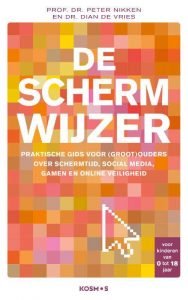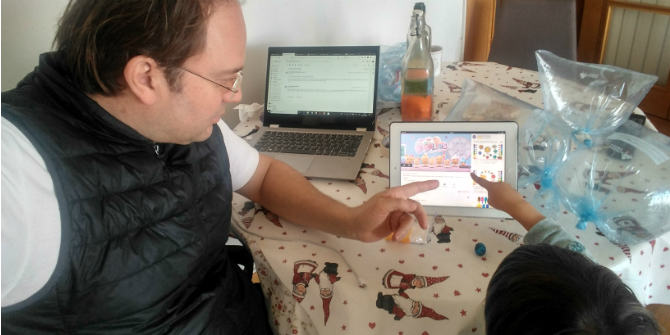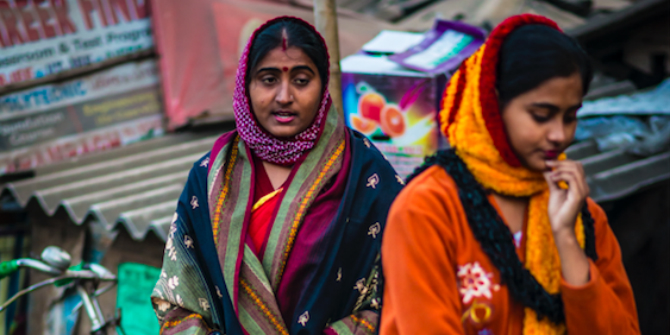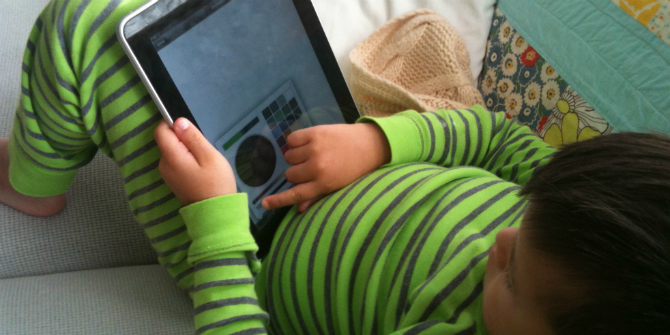 Remember doctor Spock? No not the one from Star Trek, but the author of The Common Sense Book about Baby & Child Care. Since 1946 millions of copies sold all over the world, because it gave practical and validated information to parents on health issues, and daily hassles and parenting concerns, nicely organised by topic and the child’s development. For www.parenting.digital, Professor Peter Nikken (Windesheim) talks about his new Spock-inspired book offering an overview of how contemporary media affect children at different stages of their development, paired with practical advice for parents. What can you advise parents when they are wondering about the pros and cons of VR headsets for a child, if it is bad when teens watch sexual materials, and what to do when their child wants to become a professional YouTuber?
Remember doctor Spock? No not the one from Star Trek, but the author of The Common Sense Book about Baby & Child Care. Since 1946 millions of copies sold all over the world, because it gave practical and validated information to parents on health issues, and daily hassles and parenting concerns, nicely organised by topic and the child’s development. For www.parenting.digital, Professor Peter Nikken (Windesheim) talks about his new Spock-inspired book offering an overview of how contemporary media affect children at different stages of their development, paired with practical advice for parents. What can you advise parents when they are wondering about the pros and cons of VR headsets for a child, if it is bad when teens watch sexual materials, and what to do when their child wants to become a professional YouTuber?
There’s a need for validated mediapedagogical support
The Dutch are top-ranked in the international communication sciences when it comes to children and media and they have had a nation-wide governmental approach on media- and digital literacy since 2005. This devoted attention to children and media where researchers, educators, practitioners, and media companies cooperate has resulted in several interesting and valuable enterprises. For example, there have been yearly campaigns that promote media-awareness in parents with young very children, MediaMasters lessons and quizzes for schools, Digistart training programs for librarians, or templates on how to organise a successful parents-school meeting. Yet, despite all these well-intended efforts, support aimed at parents to effectively manage their children’s media use is usually not based on research. A forthcoming doctoral study at Groningen University that reviewed dozens of examples of Dutch advice for parents from the last decade found that these are mainly risk-oriented, not tailored to the different stages of child development, sometimes even contradictory, and hardly based on scientifically validated facts, evidence or pedagogical theories. This is not dissimilar to digital media and advice in other countries, like the UK.
It is difficult for parents to choose the best parenting approach in the contemporary digital environment. On the one hand, they try to monitor their children’s media use, while managing daily responsibilities and household chores, bombarded by information in the press about the possible risks of media use. That may lead to questions and concerns about media and their children, sometimes even unnecessarily when these fears relate to hypes instead of real risks. On the other hand, parents also witness how their children from an early age become avid users of all kinds of technologies which are a source of fun and entertainment for the little ones. Sometimes parents are even taught by their children, given their proficiency in digital media, which can make parents both proud of their children’s achievements but also propel insecurity about their own media knowledge. It is hard for parents to decide what is positive and negative media use when it comes to their children, hence it is imperative that they are well supported and informed about these issues.
A practical screen guide
 Together with colleague Dian de Vries, our aim was to create a practical guide for (grand)parents that helps them with useful information on how to balance the risks of media use with the benefits, organised by age, and based as much as possible on the latest scientific research. We wanted to put parents at the front and to write a book that can be interesting to highly- educated parents as well as less affluent readers. We also wanted a book which is useful to professionals who work for and with parents in the community and to students in social work, pedagogy or communication sciences. The result was De Schermwijzer (a hard to translate double-pun title meaning The screen guide / Wise use of screens) – a practical 150-page book with chapters on parental mediation and child developmental stages from 0 to 18 years, following doctor Spock’s example of a FAQ-concept.
Together with colleague Dian de Vries, our aim was to create a practical guide for (grand)parents that helps them with useful information on how to balance the risks of media use with the benefits, organised by age, and based as much as possible on the latest scientific research. We wanted to put parents at the front and to write a book that can be interesting to highly- educated parents as well as less affluent readers. We also wanted a book which is useful to professionals who work for and with parents in the community and to students in social work, pedagogy or communication sciences. The result was De Schermwijzer (a hard to translate double-pun title meaning The screen guide / Wise use of screens) – a practical 150-page book with chapters on parental mediation and child developmental stages from 0 to 18 years, following doctor Spock’s example of a FAQ-concept.
Based on research on child development and media use, the book distinguishes 6 typical stages: infants and toddlers (0-3 years), preschoolers (4-6), early school children (7-9), school children/pre-adolescents (10-12), and younger (13-15) and older adolescents (16-18). For each age category, both more and less common concerns that parents may encounter in raising their children are addressed. For example, based on the extensive research on educational apps, television programs and parental mediation, parents are pointed to the advantages of using media together with their toddlers and how to do this. Specific tips help them to observe their child and apply active mediation by showing their own emotions or by guessing what happens on the screen. Also, the advantages and shortcomings of parental supervision vs children’s independent use of media, as demonstrated by research, are addressed so parents can adapt their behaviours accordingly.
The book also tackles the issue of what to do when preadolescents get their first smartphone. Again, based on the evidence, parents are informed about the common pitfalls when children start a social media career and how to be both supportive and vigilant to their children. Parents get specific suggestions on how to start a conversation on issues as sharing personal information, privacy settings, and online friends. The book provides light-touch information for parents through tests, for example on how to check if an adolescent’s internet or game use is becoming excessive, and summaries of take-home-messages, which can be educational without fueling anxieties or increasing the feeling of guilt. During the writing of the book, we consulted parents who helped us find the right tone and balance between the number of scientific insights and practical advice.
The book was launched digitally in March, just before the start of the COVID-19 lockdown in the Netherlands, which could not have been more well-suited and timelier as were all confined to screens for work, school and leisure. In today’s highly mediatised environment where devices facilitate all our activities, a practical screen guide has become even more necessary.
First published at www.parenting.digital, this post gives the views of the authors and does not represent the position of the LSE Parenting for a Digital Future blog, nor of the London School of Economics and Political Science.
Featured image by Andi Graf on Pixabay





